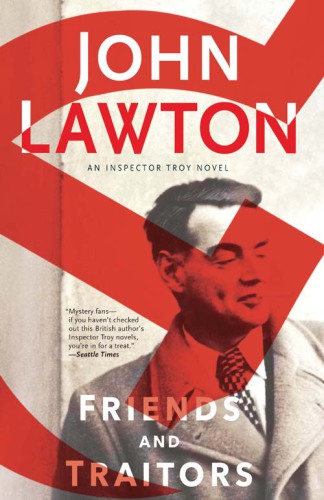
Friends and Traitors
The Inspector Troy Novels, Book 8
کتاب های مرتبط
- اطلاعات
- نقد و بررسی
- دیدگاه کاربران
نقد و بررسی

Starred review from August 14, 2017
The lives of Scotland Yard detective Frederick Troy and real-life historical figure Guy Burgess, the English traitor who spied for the Russians, intersect in Lawton’s superb eighth Inspector Troy novel (after 2010’s A Lily of the Field). After their initial meeting in 1935 at a party in Hertfordshire, Troy views Burgess as “an endless blabbermouth,” and his older brother warns him about being seen in Burgess’s company because Burgess is “queer as a coot,” and his father tells him Burgess is a spy. Despite all this, Troy finds the man intriguing. Through WWII and into the cold war era, as Troy rises in the ranks at Scotland Yard, Burgess is always hovering somewhere nearby, until he defects to the Soviet Union in 1951. Then in 1958, their paths cross again in Vienna after a concert; Burgess indicates that he wants to return to England. Troy alerts MI5, who send an agent to debrief Burgess. But when the agent is shot dead outside the British embassy, Troy becomes a suspect in the man’s murder. Lawton’s portrayal of Burgess as far less dangerous than in most accounts adds to the interest of this smart, fascinating historical thriller.

Starred review from August 1, 2017
Our fascination with the Cambridge FiveBritish spies recruited to serve the Soviet Union while still at universitycontinues unabated into the twenty-first century; recently, though, attention has shifted from Kim Philby, the most famous of the group, to the others, including Guy Burgess, perhaps the most compelling character of the lot. Lawton uses the latest installment in his celebrated Inspector Troy series to offer a beguiling interpretation of Burgess' life both before and after his defection in 1951. Although Burgess' spying was nearly as much of an open secret as his homosexuality, at least among his drinking buddies, who included Troy, the eventual defection of the Cambridge group remained an enormous black mark for Britain in 1958, when this story begins with Burgess approaching Troy with a plea: I want to come home. No easy trick when you've been a key player in what a diplomat friend of Troy's calls the 3-D Technicolor cock-up of the twentieth century. With the action jumping back and forth between the late 1950s and the war years, Lawton traces Burgess' flamboyant life as a dissolute and indiscreet diplomat whose wit and charm somehow managed to shine through the alcoholic haze that constantly enveloped him. Inevitably, Troy's attempts to set up Burgess' re-defection back to Britain go terribly wrong, but Lawton manages to generate considerable suspense in the setup, even though we know Burgess won't be coming in from the cold. Throughout, Burgess emerges as a thoroughly engaging antiheroa traitor, yes, but also a victim of the British government's abiding homophobia.(Reprinted with permission of Booklist, copyright 2017, American Library Association.)

























دیدگاه کاربران